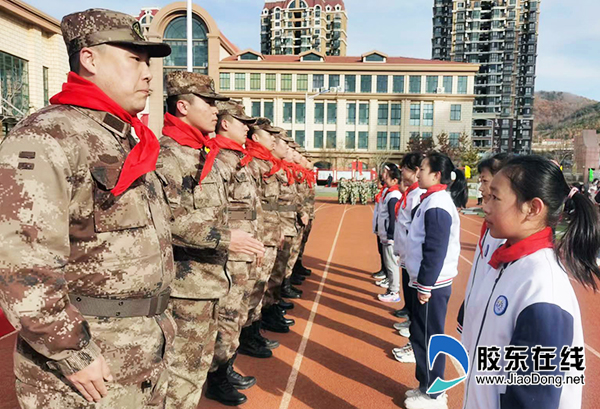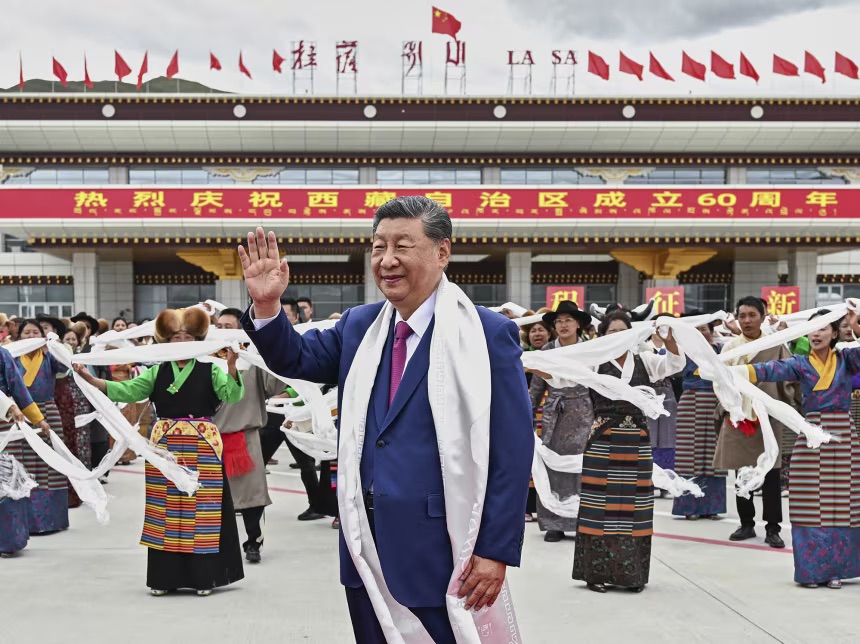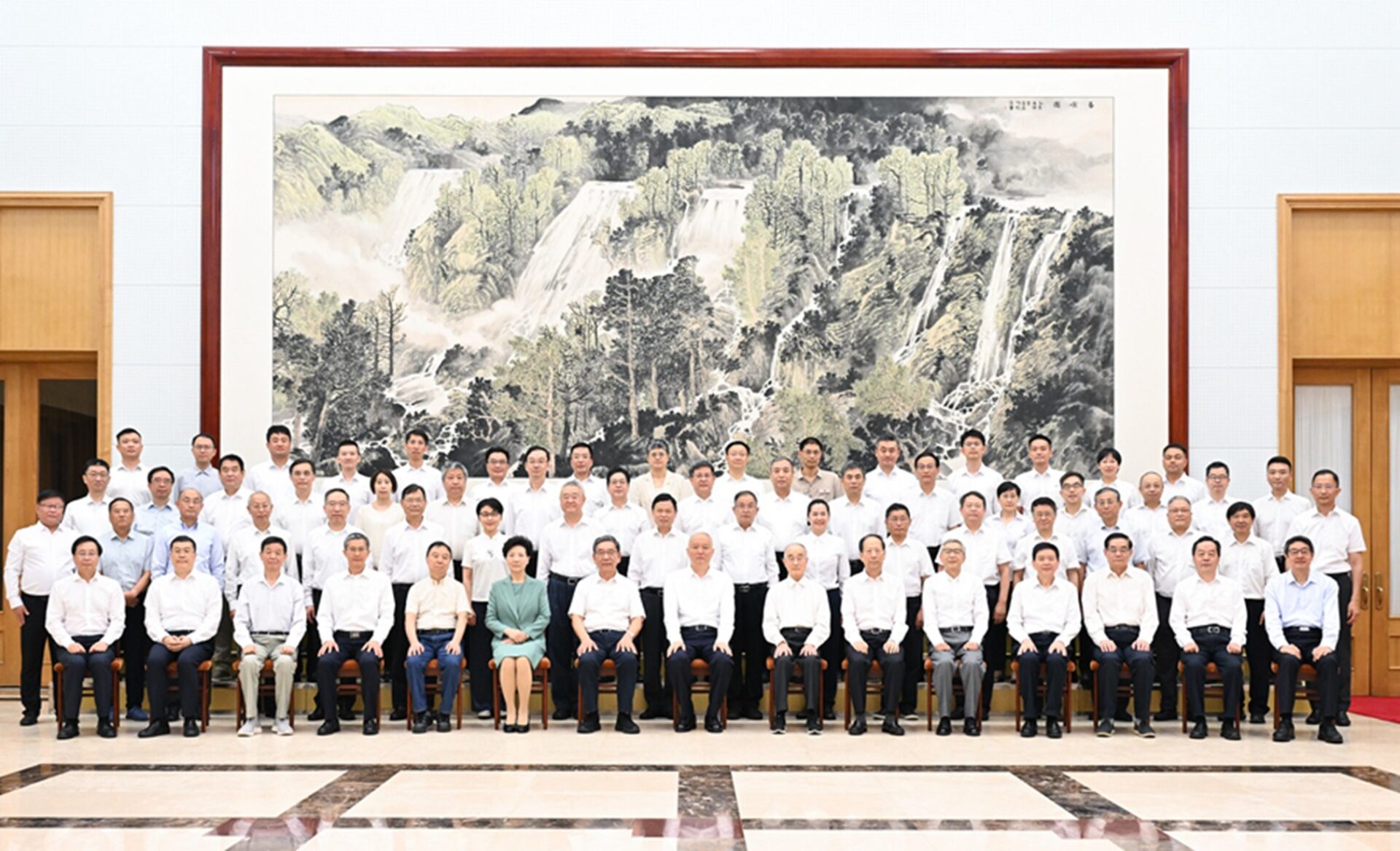
Party Pushes National Defense Education for All
Party Pushes National Defense Education for All
Last September, a primary school in Lipu City, in Southwestern China’s Guangxi Zhuang Autonomous Region, held a commemoration ceremony for the school’s designation as a “National Defense Education Model School” (国防教育示范学校) (Defense Times, September 15, 2022). At the event, local military leaders and government officials emphasized that the school achieving this designation accords with the responsibilities of the new era as laid out in Xi Jinping Thought on Strengthening the Military (习近平强军思想) and the Chinese Communist Party (CCP) Central Committee’s 2019 “Outline on Implementing Patriotic Education in the New Era” (新时代爱国主义教育实施纲要). According to a report on the ceremony in the Defense Times (国防时报), officials in Lipu City adhered to the principle that “national defense education should start in infancy.” Scenes such as this are playing out at schools all around China as “National Defense Education” (国防教育) becomes an increasingly central part of the curricula at all grade-levels. In September, the Central Committee, State Council and Central Military Commission (CMC) jointly issued the “Opinion on Strengthening and Improving National Defense Education for All Citizens in the New Era” (关于加强和改进新时代全民国防教育工作的意见), which calls for “strengthening the party’s leadership over national defense education for the whole people” (Gov.cn, September 1, 2022).
On February 6, the Ministry of Education (MOE) and the CMC Political Work Department issued a notice on the selection of 2,687 primary and secondary schools as “national defense education model schools” (Xinhua, February 6, 2023). The notice tasks provincial military systems with creating “military-civil” linkages to support the model schools within their respective jurisdictions. The purpose is for schools to develop active relationships with local military garrisons in order to facilitate People’s Liberation Army (PLA) troops holding talks, providing military demonstrations and conducting trainings for students. The network of National Defense Education Model schools has steadily expanded in recent years. In a 2021 notice, the MOE and the CMC Political Work Department called for a review of the 1,932 model schools that were established in 2017 and 2018 (Gov.cn, December 3, 2021; MOE, April 26, 2017).
In his work report to the 20th Party Congress last October, Xi referenced the need to navigate a difficult international security environment that is increasingly defined by the PRC’s intensifying strategic rivalry with the U.S. and its allies (China Brief, November 3, 2022). Consequently, the drive to inculcate a national security oriented mindset in the general public, albeit while maintaining a particular focus on youth education, is part of a broader effort to militarize Chinese society as CCP leadership seeks to brace citizens for an extended geopolitical contest with the U.S. and its allies.
Trend of the Times
The PRC has implemented various forms of national defense education going back decades to the nation-wide “patriotic education” (爱国主义教育) campaign, which was launched during the 1990s when the CCP was seeking to bolster its flagging legitimacy following the 1989 Tiananmen Square massacre and the collapse of communism in Eastern Europe (China Education News, March 19, 2020). The CCP Central Committee’s 1994 “Outline on the Implementation of Patriotic Education” included a measure for “advancing national defense and national security education” (进行国防教育和国家安全教育) (Gov.cn, September 20, 1994). However, in 2019, these guidelines were updated with the aforementioned “Outline on Implementing Patriotic Education in the New Era” (Gov.cn, November 12, 2019). The new Outline seeks to incorporate General Secretary Xi Jinping’s “major contributions” and reflect his deep interest in patriotic education.
With regards to national defense and security education, the updated official guidance on Patriotic Education calls for thorough study and propagandization (宣传) of the “holistic national security concept” (总体国家安全观), which necessitates preparing the whole party and people to “consciously safeguard political security, homeland security, economic security, social security, network security and external security.” The promotion of national security education in primary and secondary education is a key element of the PRC’s increasingly all-encompassing approach to security under the “holistic national security concept,” which was first introduced by Xi in 2014. As the strategic rivalry with the U.S. and its allies has intensified over the past half-decade, the PRC’s embrace of “comprehensive” or “holistic” national security, a trend that the Mercator Institute for China Studies (MERICS) characterizes as the “securitization of everything,” appears certain to continue (MERICS, September 15, 2022).
Mass Education
Ahead of the 20th Party Congress in September 2022, the Central Committee, State Council and Central Military Commission (CMC) jointly issued the “Opinion on Strengthening and Improving National Defense Education for All Citizens in the New Era.” This official guidance indicates that during Xi’s second decade in power, there will be no letup in the CCP’s ever-expanding push to protect its system from internal and external threats, both real and perceived (Gov.cn, September 1, 2022). As the title suggests, the “Opinion” stresses the need to ”implement the spirit of General Secretary Xi Jinping’s important instructions on strengthening national defense education for all citizens.” Per the Central Committee’s guidance, this entails not only strengthening general knowledge of national defense theory, regulations, technology and skills but also cultivating a “culture of national defense” among cadres and the masses. An editorial in the People’s Liberation Army (PLA) Daily states that a turbulent geopolitical environment necessitates a heightened state of national security readiness among the population in order to support a strong country and a strong army in the “face of a real danger of war” (PLA Daily, September 14, 2022).
One innovation of the Xi era, which testifies to the increasing institutionalization of mass national security education, is the annual National Security Education Day on April 15 (Study Times, November 7, 2022). The day was officially established as part of the National Security Law passed by the National People’s Congress in 2015 (Gov.cn, July 15, 2015). Each year, schools and work places around China hold special National Security Education Day activities for students and employees. For example, in 2019, students at the elite Tsinghua University in Beijing participated in National Security Education Day publicity and learning activities, including attending study sessions of national security reports, watching patriotic movies and viewing posters intended to increase students’ awareness and vigilance of threats such as foreign espionage (Tsinghua, April 17, 2019). Over the past three years, these activities have continued but have been largely held online due to the COVID-19 pandemic and strict zero-COVID epidemic prevention policies (The Paper, April 15, 2022).
Another way that the CCP seeks to instill patriotism and national security vigilance among the public is by promoting patriotic war films. For example, the “National Defense Wanying Program” (国防教育万映计划), which is run by the China Film Foundation (CFF) under the special guidance of the National Defense Education Office of the Central Military Commission’s Political Work Department, seeks to “provide policy, project approval and support for the creation of national defense military films” (Xinhua, October 22, 2018; CFF, October 22, 2022). In addition to facilitating engagement between the military and the film industry, the National Defense Wanying Program also holds online and in-person public screenings of patriotic films in order to “inherit the red gene,” “carry on the fine revolutionary tradition” and foster a “martial atmosphere.” The purpose of these film showings is to “use movies to tell national defense stories” (用电影讲述国防故事).For example, in October 2021, the Wanying Program collaborated with the Zhejiang Province Propaganda Department to hold a public “National Defense Film Screening Ceremony in Dongyang City, Zhejiang (Ministry of National Defense [MND], November 13, 2021). The event, essentially a film festival for patriotic movies, featured ten films, including 1921, which details the founding of the CCP in Shanghai and The Battle at Lake Changjin, which chronicles a group of PLA troops’ experiences fighting American troops in “The War to Resist U.S. Aggression and Aid Korea.”
Shaping Young Minds
While the September 2022 “Opinion on Strengthening and Improving National Defense Education for All Citizens in the New Era” emphasizes that such programs are intended for all people, particular emphasis is given to strengthening efforts to inculcate a national defense mindset in school-age youth. In order to reach China’s youth, the Opinions call for integrating national defense education requirements into the curriculum and examination content in all regular middle and high schools, as well as updating performance evaluation systems for educators (Gov.cn, September 1, 2022). Moreover, the new guidance seeks to familiarize students with the PLA by recommending that educators give “full play” to the military through student activities such as touring military barracks, attending briefings with military experts and participating in practice drills.
Recently, provincial military authorities have begun releasing directives for implementing the new “National Defense Education Model Schools” selected by the Ministry of Education and the CMC Political Work Department in their jurisdictions. For example, a notice from the Hainan Government states that 22 schools in the province have been selected as “model schools” (The Paper, February 14). The notice stipulates that each model school should hold at least two public, national defense education classes per year. Moreover, the notice calls for model schools to be given priority when organizing training (in terms of venue, instruction and equipment). Finally, each year military “open house” days will be held for students to tour military museums and barracks in Hainan.
Conclusion
It is no secret that a career in the military has historically held minimal appeal in traditional Chinese culture, a tendency, which resurfaced during the Reform and Opening Era. In recent years, the CCP has sought to address this issue by seeking to heighten the appeal of a military career, both by playing to citizens’ patriotism and by increasing PLA pay and benefits. For example, as Kenneth Allen and Marcus Clay note, as part of Xi’s agenda to “build a strong military,” the PRC established its owns Ministry of Veteran’s Affairs in 2018 with the mandate to “make the military a respectable profession” (China Brief, March 11, 2022).
Although the past three decades of patriotic education have certainly heightened nationalistic sentiment among the public, educated young Chinese are still not rushing to enlist in the ranks of the PLA. Nevertheless, Xi is clearly hoping that by instilling a “national security” mindset in China’s youth early, he can convince the younger Chinese to join the past generations of martyrs who sacrificed their lives for the motherland.
John S. Van Oudenaren is Editor-in-Chief of China Brief. For any comments, queries, or submissions, please reach out to him at: cbeditor@jamestown.org.
The author would like to thank China Brief intern Sheldon Xie for research assistance.

